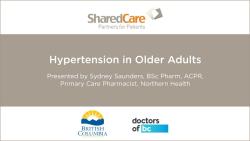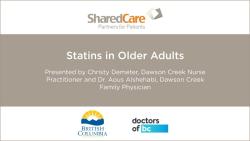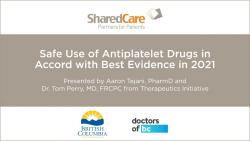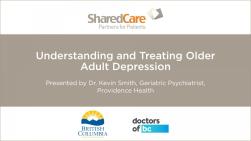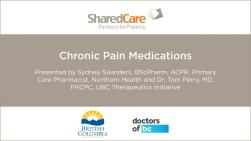Polypharmacy Risk Reduction
The following resources have been compiled to support practical physician and inter-disciplinary team approaches to reducing risk from polypharmacy in long term care, acute care, and in the community. Some resources have been designed to be adapted to your own individual setting.
- Polypharmacy Learning Sessions (South Peace Project)
-
WEBINAR 1: Type 2 Diabetes Pharmacotherapy
Polypharmacy Learning Session 1:
Type 2 Diabetes PharmacotherapyPresenters:
- Rachelle Miller, BSc Pharm, RPh, Pharm D, CDE, Northern Health Academic Detailing Pharmacist
- Sydney Saunders, BSc Pharm, ACPR, Northern Health Primary Care Pharmacist
This informative webinar describes:
- The mechanism of action, precautions, and contraindications of non-insulin hypoglycemia medications
- The evidence on the efficacy of non-insulin hypoglycemic medications and how it relates to diabetes-related morbidity and mortality
- Treatment goals for patients with diabetes mellitus in terms of patient-centred outcomes
WEBINAR 2: Proton Pump Inhibitors
Polypharmacy Learning Session 2:
Proton Pump InhibitorsPresenters:
- Dr. Charles Helm, Project Lead and Tumbler Ridge Physician
- Charissa Tonnesen, Tumbler Ridge Community Pharmacist
This fun presentation covers:
- The evolutionary role of gastric acid
- The frequency with which long-term use of PPIs contributes to polypharmacy in the elderly
- Indications for PPIs and optimal duration of treatment
- Potential problems associated with long-term use of PPIs
- How rebound symptoms may contribute to long-term prescription of PPIs
WEBINAR 3: Hypertension in Older Adults
Polypharmacy Learning Session 3:
Hypertension in Older AdultsPresenter:
- Sydney Saunders, BSc Pharm, ACPR, Northern Health Primary Care Pharmacist
This webinar discusses:
- The evidence for hypertension targets
- Clinical considerations that may impact antihypertensive choice in the elderly
The presenter also encourages participants to consider other medication classes that may impact hypertension control.
WEBINAR 4: Statins in Older Adults
Polypharmacy Learning Session 4:
Statins in Older AdultsPresenters:
- Christy Demeter, Dawson Creek Nurse Practitioner
- Dr. Aous Alshehabi, Dawson Creek Family Physician
This webinar highlights:
- The risks and benefits of cholesterol-lowering agents (primary vs. secondary) with a review of evidence for cholesterol-lowering agents and lipid targets in elderly
- Considerations when deprescribing cholesterol-lowering agents
- Decision-aid tools and communication strategies to help patients make informed decisions about statin therapy
WEBINAR 5: Safe Use of Antiplatelet Drugs in Accord with Best Evidence in 2021
Polypharmacy Learning Session 5:
Safe Use of Antiplatelet Drugs in Accord with Best Evidence in 2021Presenters:
- Aaron Tejani, PharmD, UBC Therapeutics Initiative
- Tom Perry, MD, FRCPC, UBC Therapeutics Initiative
This webinar discusses:
- When and for how long dual-antiplatelet therapy is consistent with good evidence
- When the advantages of ASA exceed its disadvantages (secondary vs. primary prevention)
- How to recognize early warnings of a serious or life-threatening hemorrhage
- How to avoid unnecessary bleeding
WEBINAR 6: Understanding and Treating Older Adult Depression
Polypharmacy Learning Session 6:
Understanding and Treating Older Adult DepressionPresenter:
- Dr. Kevin Smith, Geriatric Psychiatrist, Providence Health
This webinar covers:
- The uniqueness of older adult depression
- Treatment options for depression
- An evidence-based approach to deprescribing
WEBINAR 7: Benzodiazepines and “Z-drugs”
Polypharmacy Learning Session 7:
Benzodiazepines and “Z-drugs”Presenters:
- Sydney Saunders, BSc Pharm, ACPR, Northern Health Primary Care Pharmacist
- Charissa Tonnesen, Tumbler Ridge Community Pharmacist
This webinar reviews:
- Appropriate indications and usage of benzodiazepines and Z-drugs
- Practical non-pharmacologic interventions for insomnia
- Communication strategies to assess new onset insomnia and approach deprescribing benzodiazepines and Z-drugs with patients
- Sample tapering schedules for benzodiazepines and Z-drugs
WEBINAR 8: Chronic Pain Medications
Polypharmacy Learning Session 8:
Chronic Pain MedicationsPresenters:
- Sydney Saunders, BSc Pharm, ACPR, Northern Health Primary Care Pharmacist
- Tom Perry, MD, FRCPC, UBC Therapeutics Initiative
This session is focused on drugs prescribed for chronic pain. Key take-aways include:
- Randomized clinical trials show little or no dose response for most analgesics within the licensed dose range and low probability of meaningful success.
- Adverse drug effects are clearly dose related.
- Clinical trials indicate that net benefit or harm can be determined clinically within 1-2 weeks.
- Analgesics intended to affect the brain typically lead to pharmacologic/physiologic dependence and potentially withdrawal.
- Many patients will improve with lower doses or by weaning off drugs entirely, even after years of use.
WEBINAR 9: Final Project Presentation – Anticholinergics
Polypharmacy Learning Session 9:
Final Project Presentation – AnticholinergicsPresenter:
- Tom Perry, MD, FRCPC, UBC Therapeutics Initiative
In the context of drugs prescribed for chronic pain, this session will enable participants to:
- Elicit at least 5 potential adverse effects of anticholinergic drugs from interview and examination
- Recognize that harms of this drug class usually outweigh benefits
- Recognize that dozens of frequently prescribed drugs are anticholinergic
- Advise patients and families that disadvantages of cholinesterase inhibitors for dementia usually outweigh any possible benefits
- Try stopping cholinesterase inhibitors when they seem ineffective
The presenters also share some of the overall project successes, as this is the final presentation in the webinar series.
- Resources to develop 'New Habits for Effective Deprescribing' (Dr Mark Lawrie)
-
In this short 20 minute video, Dr Mark Lawrie shares habits and strategies he's developed over the years to reduce risks from Polypharmacy for his patients. In his own words, how to make deprescribing "more like dancing than wrestling".
ENHANCE LEARNING
A supporting document for the video has been created to enhance learning for Group Sessions and individual development. The document includes additional resources, Edna's Case Study, and reflective exercises.
A Medication Discontinuation Form can also assist you as you priorize and plan.
- Indigenous Communities: ‘Coyote’s Food Medicines’ Resources
-
 Visit Coyote Story to read and order copies of 'Coyote's Food Medicines'.
Visit Coyote Story to read and order copies of 'Coyote's Food Medicines'.The book was created by First Nations Elders in partnership with Shared Care, the First Nations Health Authority, and Interior Health, to promote conversations around healthy medication use in Indigenous communities. A short video of the Elders is also available to accompany the story.
- Video Series: Goals of Care Conversations with Dr Janz & Gina Gaspard
-
In this video series, long term care experts Dr. Trevor Janz and Gina Gaspard walk you through conversations with families around end of life goals of care. Conversations cover sensitive issues, such as: what to expect as a loved one's disease progresses (using dementia as a main example), use of antibiotics, hospitalization vs comfort care, and other topics. There are also two companion documents to these videos written by Dr Janz.
DEMENTIA ROADMAPS FOR FAMILIES AND PROVIDERS
A Dementia Roadmap for Practitioners
When Your Loved One Has Dementia - A Roadmap for Families
- You Decide Sheets
-
These brief resources, which have been reviewed by an expert clinical advisory group, provide an evidence summary specific to the elderly, plus a few practice points, for key drug classes. They have been developed to inform medication reviews and decision-making.
Antidepressants in the Frail Elderly With Dementia and Depression
Osteoporosis Drugs in the Frail Elderly in Long Term Care
Antihypertensive use in the elderly in Long Term Care
Proton Pump Inhibitors (PPIs) for the Elderly in Long Term Care
- External Initiatives & Resources
-
Canadian Deprescribing Network and the Deprescribing development groups: https://www.deprescribingnetwork.ca: This site contains many very useful resources for both health professionals and patients. Of particular note for health professionals are deprescribing algorithms for PPIs, antihyperglycemics, antipsychotics, benzodiazepines and cholinesterase inhibitors/memantine: https://www.deprescribingnetwork.ca/algorithms/ or found at: https://deprescribing.org, with more resources.
The PATH Group (Palliative and Therapeutic Harmonization) in Nova Scotia have developed an approach to supporting frail patients and their families to make evidence-informed decisions. Working with others in Nova Scotia, practice guidelines appropriate for the frail elderly have been developed for management of type 2 diabetes, hypertension, statins and depression: https://pathclinic.ca/education/clinical-practice-guidelines/ .
Choosing Wisely Canada. Choosing Wisely is a campaign to help physicians and patients engage in conversations about unnecessary tests, treatments and procedures, and to help physicians and patients make smart and effective choices to ensure high-quality care. https://choosingwiselycanada.org/geriatrics/,
https://choosingwiselycanada.org/psychiatry/Canadian Frailty Network: http://www.cfn-nce.ca
MedStopper is a deprescribing resource for healthcare professionals and their patients that has been developed at the University of British Columbia, Faculty of Pharmaceutical Sciences with the support of clinical experts from across Canada. It has been found useful to support decision-making around medication use and deprescribing with patients and families. http://medstopper.com/
Numbers needed to treat by specialty. http://www.thennt.com/home-nnt/
GPAC BC Guidelines on Cognitive Impairment and also on Frailty: https://www2.gov.bc.ca/gov/content/health/practitioner-professional-reso... and https://www2.gov.bc.ca/gov/content/health/practitioner-professional-reso...
- Long Term Care (previously Residential Care)
Overview of Long term care
Read this short summary for an overview of Polypharmacy Risk Reduction in Long Term Care
Introduction to 'Building Local capacity & Sustainability' sessions
The goal of the 'Building Local Capacity & Sustainability' (BLCS) sessions is to facilitate discussions with local physicians and others involved in long term care, on improving the approach to inter-disciplinary meaningful medication reviews. The sessions also provided the opportunity to present helpful resources, tools and templates that could be used and adapted by local communities.
learning outcomes of BCLS Sessions
Physicians will have an awareness of:
- Risks of polypharmacy risk and how to safely reduce that risk
- How knowledge of the dementia trajectory, and goals of care, set the context for polypharmacy risk reduction
- How and when to use clinical resources and strategies to facilitate polypharmacy risk reduction
- Local interdisciplinary approaches to Meaningful Medication Reviews within the Long Term Care Initiative
Building local capacity & sustainability - Session 1
The following are templates and supporting documents to assist you as you conduct your own community Polypharmacy Risk Reduction sessions:
- Agenda
- Case Study - Alice
- Clinical Frailty Scale
- Stages of Dementia (PATH)
- Statin You Decide Sheet
- Anticholinergic Cognitive Burden Scale (legal size)
- MedStopper - Alice
- Goals of Care Medication Review Template
- Goals of Care Medication Review - Alice
Links to Session Presentations:
BUILDING LOCAL CAPACITY & SUSTAINABILITY - SESSION 2
The following are templates and supporting documents to assist you as you conduct your own community Polypharmacy Risk Reduction sessions:
- Agenda
- Antipsychotics You Decide Sheet
- Goals of Care Medication Review Template
- Victoria Mount St. Mary's Medication Review Preparation Form
- Interdisciplinary Approach for Group Discussion
- Case Study - Rosenberg
- MedStopper - Rosenberg
- Goals of Care Template - Rosenberg
Links to Session Presentation:
Resources Supporting Meaningful Medication Reviews
In the last few years, there have been a number of locally developed tools across the province, to prepare for medication reviews, usually involving care staff and pharmacists. Mount St. Mary’s hospital in Victoria is a site that developed, tested, implemented and audited a suite of such tools. This approach was found to be very effective and engaging for the staff. These tools can be modified to suit your particular care setting if required.
Mount St. Mary's Medical QI and Pharm Review
Mount St. Mary's Medical QI and Interdisciplinary Team Medication Review
Chart Reviews by Medical Coordinator
Interdisciplinary Team Medication ReviewsExternal Resources
The Clear initiative (Call For Less Antipsychotics in Long Term Care) is supporting care homes in BC to provide person-centered care for residents with the behavioural and psychological symptoms of dementia (BPSD). There are many resources on the website that support this work. http://www.clearbc.ca
- Acute Care
-
OVERVIEW OF acute CARE
Polypharmacy Risk Reduction in Acute Care supports strategies to improve the medication journey processes and communication within the acute sector.
Read this short summary for an overview of Polypharmacy Risk Reduction in Acute Care.
The resources below have been provided to allow for sharing with other communities interested in engaging in similar projects in their acute care sites.
Thompson region/royal inland
- Final Report
- Presentation
- Medication Journey Mapping
- Medication Reconciliation at Discharge - ABCD's for Physicians
- ABCD's for Physicians - Bookmarks
- Medication Reconciliation at Discharge - ABCD's for Unit Clerks
South Okanagan Similkameen
- Final Report
- Project Report
- Have You Seen This Stamp On Your Patient's Progress Notes? - Poster
- 5 reminders - reviewing medications with your patient - Poster
- 5 questions to ask about your medications - Poster
- Medication Review - List of Online Resources
Peace arch
- Community
-
INTRODUCTION TO 'BUILDING LOCAL CAPACITY & SUSTAINABILITY' in community SESSIONS
The goal of the 'Building Local Capacity & Sustainability' (BLCS) sessions is to facilitate discussions on how to improve the meaningful medication review approach among physicians and community health care providers, including acute care providers working on transitions of care, and pharmacists. The sessions also provided the opportunity to present helpful resources, tools and templates that could be used and adapted by local communities.
BUILDING LOCAL CAPACITY & SUSTAINABILITY
The following are templates and supporting documents to assist you as you conduct your own community Polypharmacy Risk Reduction sessions:
- Agenda
- Overview Slidedeck
- Case Study - Miss Pisa
- Clinical Discussion Slidedeck
- Community Approach - Goals of Care Arrow Diagram
- Clinical Frailty Scale
- Developing a Medication Plan through Medication Review
- Statin You Decide Sheet
- PPI You Decide Sheet
- PPI Deprescribing Algorythm
- Patient Deprescribing Pamphlet
- NO TEARS Tool for Medication Reviews
- Table - Enhancing Local Approach to Polypharmacy Risk Reduction
Contact
For more information, please email Shared Care.




